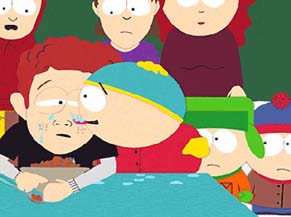Make an Argument
Why Comedy Central made a huge mistake when it self-censored South Park
By Eric Hughes
April 29, 2010
A series like South Park is, of course, protected under the First Amendment. Even better, it’s protected from being liable for defaming individuals, businesses, groups, the government and the like because it is both a parody and a cartoon. That’s the reason South Park’s satirical storylines carry such bite. The series is lawsuit-proof.
Sure, the humor in South Park can be sophomoric at times. But the series wouldn’t have been nominated for an Outstanding Animated Program Emmy eight times (winning four) if its showrunners didn’t place a critical eye on themes and ideas lifted from current events and pop culture.
To the best of my knowledge, this marks the first time that Comedy Central self-censored material on South Park, save for vulgar language and a depiction of Muhammad that was similarly banned from the show in the April 2006 episode, Cartoon Wars Part II.
I’d love to hear the reasoning behind airing a series like South Park on cable at 10 p.m. if the show is unable to take advantage of the freedoms afforded by the primetime timeslot. By removing all visual and verbal depictions of Muhammad – so much so that the parody, and more importantly, the message, is erased – Comedy Central may as well air the show on weekends at noon to capture an even larger audience than the one that typically tunes in on Wednesday nights.
Censoring Muhammad’s name sets a dangerous precedent
Casual Comedy Central viewers who tuned in for South Park’s April 21st episode, 201, probably had little to no idea what the episode was even about. With Muhammad’s image, voice and name – and lengthy concluding monologues having nothing to do with Muhammad – censored by Comedy Central, the lead storyline was rendered completely incomprehensible. Because the network did this on its own accord – and not, as is usually the case, due to pressures from the Federal Communications Commission* – the act of self-censorship sets a dangerous precedent.
The reason? Self-censorship symbolically demonstrates “favoritism” on what the network feels is appropriate for cable and what isn’t. For example, in March 2007 Comedy Central aired 43 uncensored uses of the “n” word in South Park’s season 11 premiere, With Apologies to Jesse Jackson. This says that the suits at Comedy Central pardon a racially charged ethnic slur – a word, really, that some people feel should be abolished – while prohibiting visual representations of a figure who Americans probably care little about. (Cartman actually references this supposed truth in 201 when he states that audiences will be more concerned with who his real father is – the episode’s B story – over a depiction of Muhammad).
What’s surprising about With Apologies to Jesse Jackson is that Kovon and Jill Flowers, co-founders of an organization linked to the NAACP that aims to abolish the “n” word, praised both the episode and, indirectly, Comedy Central’s decision to air the “n” word uncensored. They said: “This show, in its own comedic way, is helping to educate people about the power of this word, and how it feels to have hate language directed at you.”
Continued:
1
2
3




